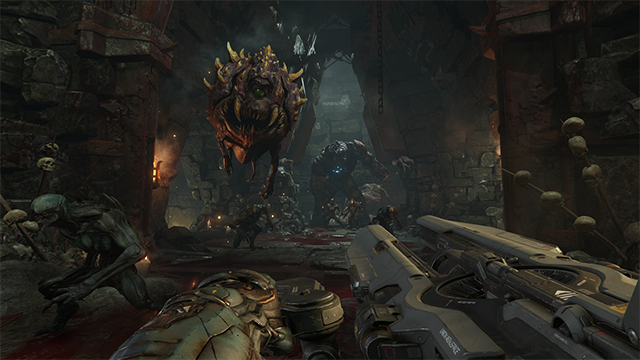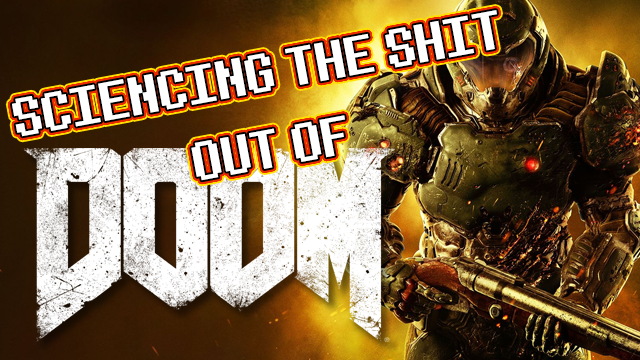I think that we can all agree that DOOM is intended to be over the top. The very nature of that game is extreme, excessive violence. Even though many reviewers were surprised by the polish and storytelling of the single-player campaign, that is not what surprised me. Being someone who loves to see real-world science being applied in a fantastical setting, I was taken aback by some of the realism applied to the weapons in this ultra-violent video game.
I remember another ultra-violent video game released a couple of years ago called Bulletstorm? Anyone remember that? This game rewarded players for the ridiculously destructive combos performed during kills, but the physics of the game made me want to pull my hair out.
Why is DOOM acceptable, but Bulletstorm was not? I don’t want to give the impression that I think DOOM is on the money, but there are some great things that this game does that even Mass Effect didn’t last week. Let’s take a look at the good and the bad when we science the shit out of DOOM’s weapons.

Recoil
Last week, I didn’t get into the science behind recoil. If you happened to follow the link I provided last week, then you’d see that calculating the actual force on the user is complicated and is varied on many factors based on the design of the weapon. But ultimately, there are two things that you need to know: the third law of motion and angular momentum.
Newtonian Laws
Everyone should know Sir Isaac Newton. We are all at least familiar with his three laws of motion. When firing a weapon, all three are represented. The first: an object at rest will stay at rest unless acted on by another force, and an object in motion will stay in motion unless acted on by another force. The second is the force of an object is equal to its mass multiplied by its acceleration. And the third is that every action will have an equal and opposite reaction. It’s this third law that we are most interested in this week.
Since I like to show math in this series, I will show you the simple calculation for how we show that the force of the force acted on a bullet leaving the chamber is the same as the force acting on the gun itself. The first m will represent the mass of the bullet and the second m will represent the mass of the weapon. The first a is the acceleration of the bullet and the second a is the reverse acceleration of gun, which will be a negative number.
mb•ab+mg•ag=0
The force of the bullet will equal zero when added to the reversed force of the weapon, except we also have to include the mass of anything that the weapon comes in contact with. So that means the person firing the weapon and anything physically associated with that person will also factor into the equation. The suit the player wears in DOOM factors into the amount of recoil that we would see in any given weapon.

Muzzle rise
Now, let’s talk angular momentum. A search on YouTube for recoil will land you on some horrifying and sadistically funny videos of people not anticipating the amount of recoil a weapon will exert, or most commonly, which direction the force will be exerted. If we look at the typical handgun, you’ll notice that the barrel sits above the grip. This means that the majority of reverse force will above the person’s hand. That puts the center of mass below the barrel, pulling some of the momentum back toward person’s hand. Most of the time, the wielder will reverse much of that angular momentum if it’s anticipated, but if left to its own devices, the gun would actually spin over and over around that center of gravity.
DOOM weapons analysis
When watching the video that ScereBro made showcasing each of the weapons, we can see exactly what happens with each of them when fired. And although it’s difficult to calculate exactly how much reverse force is placed on the player when the weapon is fired, the standard projectile weapons appear to be pretty sound. The Burst Rifle, Chain Gun, Assault Rifle, and shotguns seem to be fine with the backward momentum and muzzle lift. I particularly like the lift on the Super Shotgun and the Vortex Rifle
But what about the non-standard weapons? Well, the Lightning gun is great. It’s electricity and for all intents and purposes, electricity doesn’t have mass. So there would be no recoil, and there isn’t in DOOM. I do have a bit of an issue with the plasma rifle, though. My trouble is that in the plasma rifle they are almost treating the weapon as if it was firing a low mass weapon, and if the balls of blue fire are any indication of how big the mass of plasma is, the plasma rifle should a larger amount of recoil based on how much force it would take to move the projectile at that speed. In fact, the plasma rifle should act more like the BFG.
With one small exception, DOOM did it right in my humble scientific opinion. What are your thoughts? Science isn’t science until it’s been tested and retested. Let me know your thoughts in the comments, and let me know what other games and game tropes I should science the shit out of in coming weeks.







Published: May 19, 2016 07:11 am